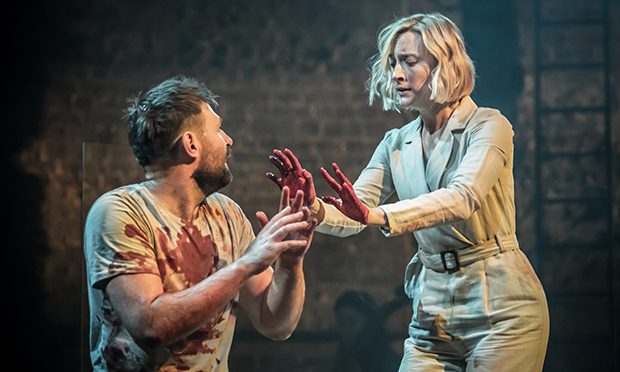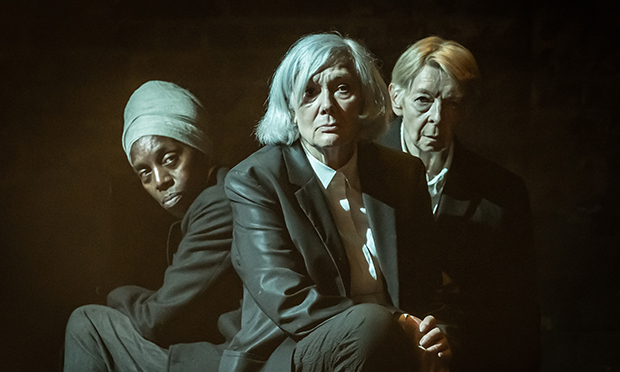The Tragedy of Macbeth, Almeida Theatre, stage review: ‘Out to shock – and shock it does’

One of the bard’s bloodiest and most misery-soaked plays is taken a grisly step forward by director Yaël Farber at the Almeida. The Tragedy of Macbeth is a literal bloodbath of spine-chilling proportions.
The rise to power and lust of Lord and Lady M is so invested in modern culture they have woven themselves into the dialogue around ambition.
But how to put a spin on this age-old tale? First: fill it with glittering film stars.
Saoirse Ronan as Lady M is an unusual but inspired choice. Fairer and slighter than the classic dark-headed seductress, she warms up nicely into the role. Mini but mighty, her manipulation of Macbeth is impressive, yet her slow slide into insanity is much more watchable. The cracking of that lovely face and hard ambitious mind into horror at her husband’s action is masterfully conceived.
Equally, James McArdle builds a layered performance as the eponymous Macbeth. Massive in stature, he gives an energetic performance, fitting with the dusty war-torn setting. His accent is thick, his madness great, and like a despotic Assad or Stalin, his evil deepens with every moment.
The scenes with Ronan and McArdle, especially in the sweating marriage bed, really land. The power two people have to propel each other towards ruin wouldn’t be so plainly felt without their animalistic connection.
The wyrd sisters, played by Maureen Hibbert, Diane Fletcher, and Valerie Lilley, avoid any cringe-worthy spookiness. Cool and collected in dark suits, and shocks of white hair or headscarves, they watch the action seated behind the audience, but invest themselves physically at points. More active agents than just harbingers of doom. This is an interesting twist, moving away from the tropes of 16th-century witch hunts and giving a more Hellenistic approach (the Fates).

Akiya Henry’s guttural wailing and spirited performance as Lady MacDuff, along with Aoife Burke’s droning cello, keep a bubbling and slightly wearing sense of dread dripping throughout.
Another way to leave your own bloody handprint on the play is to amp up the violence. Setting aside Titus Andronicus, Macbeth might snatch the title as Shakespeare’s most savage creation. Farber’s directorial focus on this, along with Kate Waters’ hyper-realistic fight scenes, is shockingly brutal. Despite trigger warnings, even my hardened heart was rent when Lady MacDuff and her young children meet their end. Effective, but at what price? Experiencing even simulated violence five nights a week must leave some mark on young minds? Maybe I’m being overly sensitive?
Visually, the production is stunning but safe in its recontextualisation. We are given a modern, monochrome, dirty interpretation of the classic. All army boots, Nazi-esque uniforms, and guns as swords: understandable but sadly done to death.
Nevertheless, Soutra Gilmour pulls out some lovely imagery to make up for this along with some clever use of transparent screens for walls. An obsession with reflections continues, and flooding the stage in a thin film of water, spreading out like blood for the last act, is inspired. A little like Singin’ in the Rain, or should I say Slayin’ in the Rain (insert satisfied theatre chuckle), my position four rows back was gleefully coveted.
The double image of Lady M crouched down in the growing pool is breathtaking – shame it’s repeated another five times. What is it about Big Will’s work that suddenly necessitates everyone to drop to their knees? With every shade of betrayal, realistic and, dare I say it, gratuitous violence, this piece is out to shock – and shock it does. Both the visual beauty and horror are overexposed, reflecting maybe the desensitisation of both old and young in the modern world. Some strong performances pull every last drop of pain out of the script, and with expert directing and design, the piece retains an overall elegance.
As Macbeth states, “give words sorrow”, and if you want purified sorrow, the Almeida is the place to go.
The Tragedy of Macbeth runs until 27 November at the Almeida Theatre, Almeida Street, N1 1TA.
